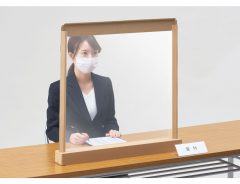- Tags:
- coronavirus / COVID-19 / lockdown / Suicide
Related Article
-

Japanese maker develops no-contact touch panels for hospitals
-

Spotted Eels at COVID-closed Sumida Aquarium Have Forgotten What Humans Look Like
-

Japanese anti-plague demon Amabie now has its own pudding
-

Japanese politicians suggest beef tickets, free masks will shield Japan from pandemic: residents disagree
-

Japanese maker mass produces lightweight and easy to assemble partitions for use at events
-

Minor hero from Kinnikuman wants to save the world from coronavirus with non-contact hook



2020 has been an extraordinarily strange year. It’s hard not to wonder whether the massive public spending and political strife seen in some parts of the world will boil over into something more unsettling. According to some, economies like Japan could be set to roll over, while a resurgence of the virus could happen in the fall if it’s not already under way.
Yet, in some ways, the better side of some individuals have a shown through. A husband remembering why he fell in love with his wife, companies branding products with images to disperse the disease, and individuals innovating new products to stop transmission.
And in other good news, the rate of suicides appears to be dropping. Perhaps a sign that some increased time at home and the end of stressful commutes are doing everyone some good.
Stress Factors and Suicides Drop During the Lockdown
Last month, the Guardian and several other news outlets reported that suicides had dropped as the Japan experienced a nationwide stay-at-home order. Suicides, which have been declining in recent years except for among young people, are a pertinent social issue in the country home to the tradition of seppuku.
As we recently reported on, staying home may provide relief to individuals who experience large amounts of stress in their day-to-day lives. For young people, relief likely comes as an escape from bullying, while business people have the chance to take a break from stressful commutes and high-pressure office environments.
According to the Guardian, the suicide rate fell by 20% in April compared to the same time in 2019. This drop, the largest seen in five years, comes despite the fact that many suicide prevention organizations were forced to shut-down during the lockdown. The result was likely surprising to some as teleworking comes with its own set of stressors, not least of which was an increase in divorce, an acutely stressful event.
A Happier Future?
If this trend has staying power, that would obviously be a great development for this society. Public perception is increasingly concerned about the prevalence of suicide, and the government is in the midst of a campaign to limit the number of incidents.
Fortunately, major companies are pushing teleworking business modelsrecently in a bid to limit infections. The government also appears keen to continue the practice as they continue to assert the importance of work-life balances and women’s empowerment.
Nevertheless, celebrations about the decline in suicide would likely be premature. The fallout of the pandemic, economic and otherwise, is still playing out. If job losses spike, a negative impact on mental health will be widely felt. The fact that many suicide prevention hotlines are struggling to stay open only worsens the situation.
The operator of a Tokyo-based suicide prevention organization told the Japan Times, “Whether COVID-19 drags on or not, I think it’s unavoidable the risk of suicides will increase going forward.” People are likely to face financial hardship as time drags on. In such a case, as with the Great Tohoku Decade and the economic malaise of the 1990s, suicides could rise moving forward.
According to Shimizu, a sense of solidarity and security among citizens would likely best be the best antidote to such a dire forecast. For this, governments must limit homelessness while beefing up welfare benefits and providing a social safety net. As the number of applicants for welfare benefits has recently risen, the issue certainly needs to be addressed. Fortunately, the government seems motivated to limit suicides and maintain the positive momentum towards fighting the issue that it has experienced in recent years.
Suicide prevention hotlines
Help is always available.
Please click here for a list of the closest hotlines where you live.